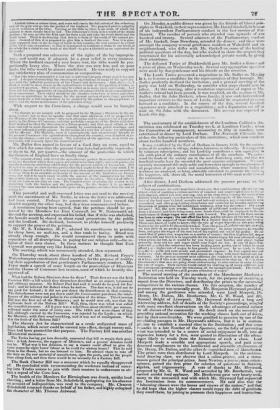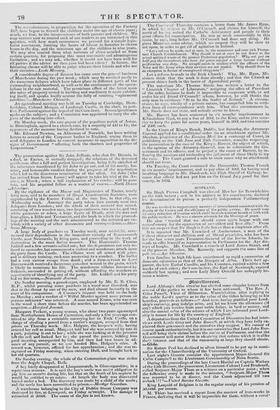The anniversary of the establishment of the Lambton Collierios As-
sociation was celebrated on Tuesday week, at Lambton Castle ; when the Committee of management, amounting to fifty in number, vere entertained at dinner by Lord Durham. The Newcastle Chronicic fur- nishes the following particulars of this institution ; which now numbers about twelve hundred members.
It was established by the Earl of Durham in January 11,13, fir the retrial"- nance of its members in old age, sickness, lameness, or infirmity. It is supporta by voluntary subscription; and his Lordship contributes a stint equivalent e one sixth part of the ordinary contributions of all the members. We a tiJer - stand the funds of the society are in the most flourishing state, and that the beneficial results have far exceeded the most sanguine anticipation. We mum earnestly recommend this truly noble and benevolent example to the at tentina all proprietors of great works and manufactories, where numerous bodies workmen are employed, as being admirably calculated to promote the we'.:;.:re, the happiness, and, above all, the moral instruction of this most useful c3.ess the community.
After dinner, Lord Durham addressed the persons pzeseat on tio subject of combinations.
" Sad experience (he said) must have shown you that combinations ellecre.1 ;Ise object—that of enabling a certain number of cunning and unpri.r.ciplicl men to be at your expense, whilst you were starving, and, at the same time, raining the (rile lithe district, which in many rases has been transferred to other parts of the country. The, lass s of the laud were violated, assaults and italeeent outrages, nay, nen Taunters were committed, and after perpetuating disturbance and confusion for months, and leVying thousands of puttpds from the industrious workmen, what was the result ? Did wat9e. advance? No, the very reverse. Thousands of additional workmen were breue,,lit from a distance. and there being many more hands than could be employed, in th.s na- tural course of things wages were still more lowered. The pretence for these unions has been to raise wages; the real effect has been, not the advance of the rate of waçes. but merely the support of those delegates for a limited time in idleness mid luseer. These men know, or ought to know, that the rate of wages depends on the price !ads
is given by the public for the article wOrkeiL i;ow, titejirke os Te15
so, that little or no profit is made by the coalowner. In many instances he aetuafiT lases, and pays the wages of his men out of his capital, not out of his proSte. lie afl- sated that if prices rise, wages rise as a matter of course; but that if pricesfall. raper must also fall, and that it is as impossible for the master to pay his men advanced wages when prices ate low, as it would he for you to pay your butcher and grocer hiesai. prices for meat and tea and sugar whilst your wages are low. If any of tIrst: dele- gates tell you that the coalowner has been making great profits, out of which Items:11 afford y .1 higher rate of wages, he has grossly deceived yon. In no trade is there less rev, hi; profit and more steady and permanent expense. In fact, capital knesval in the sea' :rade alfenls less interest than almost any other, with more hazard and certainty. Al the pres.ent tnoment most collieries are conducted at no profit at alt, ax at a loss; and if this state of things continues, will have to be shut up. It ii1 there circumstances that men are going about endeavouring to raise unions in order to raise the rate of wages. Their success would entail the shutting up of many collierieF. anti the consequent spreading over the remaining all the unemployed hands. The result., I need not tell you, would be atilt greater reaction of wages."
The annual meeting of the Members of the Manchester Mechaniac Institution was held on Tuesday week, for time purpose of receivirt„a report from the Directors, and distributing the prizes to the sucoessful competitors in the various classes. On this occasion, the number of persons present was unusually great. Mr. Benjamin Heywood presided; and among the gentlemen who attended, were Lord Morpeth, Dr. Henry, Dr. Dalton, Mr. Brotherton, Mr. G. W. Wood, and Mr- Samuel Bright of Liverpool. Mr. Heywood delivered a long exit interesting address, full of details of the Society's proceedings, ininghsd with many excellent observations on the advantages of mental claim to all classes of the community. He dwelt much on the necessiq- providing rational recreation for the working classes both out of doors and by their own firesides. We were gratified to perceive by one of die coaeluding passages in Mr. Heywood's address, that it is in contain- p1.: lion to establish a musical class in the Institution ; and that some reinarks in a late Number of the Spectator, on the folly of pervert-vita what was intended to be a source of social enjoyment to all, into se expensive luxury for a few, were quoted in illustration of the advan- tages likely to result from the formation of such a class. Lord Morpeth made a sensible and appropriate speech, and paid some deserved compliments to the intellectual and scientific attainments cof Dr. Henry, Dr. Dalton, and the other di- tinguished men of Manehestei The.prizes were then distributed by Lord Morpeth. II/ the architec- tural drawing class, we observe that a calico-printer, and a stone.. mason gained the principal prizes. Isaac Newton, a journeyman cotton- spinner, gained the first prize for solution of questions in fluxion*, algebra, and trigonometry. A vote of thanks to Mr. Heywoott proposed by Mr. G. W. Wood and seconded by Mr. Brotherton, was aimed amidst loud applause. Mr. Brotherton gave very hearty testi- mony to the unwearied zeal with which Mr. Heywood bad supporta!! the Institution from its commencement. He said also that the "labouring classes were the bones and sinews of the nation," and Ilse he did hope that the higher classes would repay the debt of gratituie they owed them; by joining to promote their happiness and instructioss.
The manufacturers, in preparation for the operation of the Factory Bill, have begun to discard the children under the age of eleven years ;
uc , we fear, to the inconvenience of both parents and children. We alay venture now to remind such of our readers as are interested in this question, with how much earnestness we pressed for a simple legis- lative enactment, limiting the hours of labour in factories to eleven hours in the day, and the minimum age of the children to nine years. We may also remind them what torrents of abuse assailed us from certain quaiters, for proposing this most reasonable and advantageous limitation ; and we may ask, whether it would not have been well for all parties if the advice we then gave bad been taken ? In future, the labouring classes will be able to judge who are their fiends and who are their enemies—Leeds Mercury.
A considerable degree of flatness has come over the general business of Manchester during the past week ; which may be ascribed pactly to the numerous failures which have taken place in different parts of the surrounding neighbourhood, as well as to the continuance of the specu- lations in the raw material. The pernicious effect of the latter upon the value of property vested in building and machinery is again exhibit- ing itself; and speaks loudly against the folly of courting "ephemeral sunshine."—Manchester Chronicle.
An agiicultural meeting was held on Tuesday at Cowbridge, Here- fordshire, Colonel Morgan, of Landon!, Castle, in the chair, to peti- tion Parliament against the repeal of the Corn-laws. Severe, lgentlemen spoke on the subject ; and a Committee was appointed to carry the ob- jects of the meeting into effect.
On Monday week, the rate-payers of the populous parish of Aston, in Birmingham, agreed to a church-rate, by a majority of 441 to 15; the opponents of the measure having declined to vote.
Mr. Edmund Newton, an Alderman of Norwich, has been writing letters to several of the Corporate bodies in England, urging them to send delegates to London to concert measures in opposition to the de- signs of Government "affecting both the charters and properties of Corporations."















 Previous page
Previous page